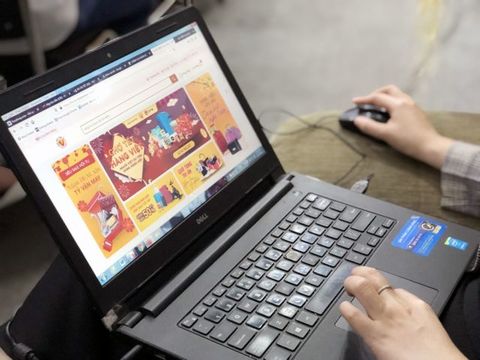
A shopper browse products on an e-commerce platform. Viet Nam is becoming the leading market for e-commerce in Southeast Asia. — VNA/VNS Photo My Phuong
The COVID-19 pandemic has helped e-commerce platforms in Viet Nam achieve impressive growth of 18 per cent, pushing the market size to US$11.8 billion.
According to a report on Viet Nam’s digital advertising market released on June 1, new users of e-commerce platforms grew 41 per cent during the pandemic.
The report by Adsota Company and strategic partner SOL Premier said up to 91 per cent of users will continue using these e-commerce platforms after the pandemic ends.
Dang Phu Vinh, manager of Adsota, told Viet Nam News: “With such growth, e-commerce now accounts for 5.5 per cent of the total retail sales of goods, services and consumption in Viet Nam.”
The country is becoming the leading market for e-commerce in Southeast Asia.
Industry experts said consumer habits and behaviour changed to adapt to trading online, and businesses and service providers have to understand and find ways to personalise their consumer experience in the "new normal".
CEO of Adsota, Tran Quoc Toan, said many large businesses and organisations have succeeded in doing so.
He mentioned Lazada with its application of influencer marketing to attract buyers, the Ministry of Health with music videos that attract a record number of viewers, Daikin with its rapid digital transformation and PizzaHome with innovative products.
Vu Thi Thu Ha, deputy director of Planning and E-commerce of Daikin Vietnam, said: “Knowing customers’ demand in the pandemic, Daikin quickly built Daikin Eshop to create an online dealer system to help them order products at the nearest dealer with less physical contact.”
The firm also launched a convenient "digital manual" for air conditioning maintenance and repair to better serve customers.
Ha told Viet Nam News that with the move to digital business activities and customer services at the right time, Daikin Vietnam has clearly demonstrated its agility in catching up with trends and grasping customer psychology.
She added: “Thanks to that we received positive feedback from consumers and could optimise digital transformation in the coming years.”
Focusing on customers, Phan Le Khoi, marketing director of Bitexco Joint Stock Company – one of the biggest realty developers in Viet Nam, said Bitexco divided their consumers into groups to use different ways of communication based on the product, utility and characteristic of the customer.
Khoi said Bitexco’s The Manor products were priced at VND30 billion (US$1.29 million) per villa, which should not be occupied by one or two end users, but a group of users or a multi-generational family with various demands, so a traditional sales programme could not mee their needs.
Instead, the firm combined different manners of media, events, PR and promotions on both online and offline platforms to serve each group. Khoi said the new method helped the firm increase sales.
According to the report by Adsota, published every year since 2013 on the local digital market in Viet Nam, as social distancing has forced people to minimise outdoor activities, customers have looked for alternative sources of entertainment and interaction online. Livestreaming has emerged as a popular form of entertainment because of its ability to transform content and high interactivity.
It said 69 per cent of survey respondents said they watched more streaming content at home than they did before the pandemic.
At the same time, in just half a month since the social distancing order, all livestream metrics on Facebook Gaming have increased significantly. In detail, total views increased 81.37 per cent reaching 119.7 million viewers, with the interaction and access ratios increasing by 79.6 per cent and 50 per cent, respectively.
Data from 7Saturday's Report shows that up to 90 per cent of Vietnamese shoppers trust influencer reviews, while only 33 per cent trust advertisements from brands.
The pandemic also had a great impact on the influencer community thanks to the diversity of fields and the ability to deliver ingenious content. Influencer marketing has become the choice of many industries, typically FMCG, technology, beauty and e-commerce while the variety of costs made them also suitable for lots of different sized businesses.
The report estimated costs for influencers in Viet Nam range from VND500,000 and VND1.5 million for less famous influencers, and up to VND45 million to VND100 million for the famous ones.
The report also said the pandemic made consumers' price sensitivity no longer a leading factor in purchasing decisions, mentioning consumers tend to save more, but at the same time instead of choosing cheap products, they are interested in products with good quality and health benefits.
It also found that items with strong spending included essential items, especially food, internet services, housing and utilities, and healthcare. Contrary to this upward trend, spending on beauty and entertainment products/services plummeted due to strict social distancing measures. — VNS